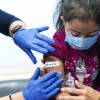Schools will no longer be advised to exclude asymptomatic students and staff who were exposed to COVID-19 from school activities, according to a memo Monday from the state's DPH and Department of Elementary and Secondary Education.
"With COVID-19 vaccines now readily available, treatments accessible to those at higher risk for severe disease, and widespread availability of self-tests, DESE and DPH have continued to evolve our support for schools in collaboration with the medical community and in line with the most recent CDC guidance issued August 11, 2022," DESE commissioner Jeffrey Riley and DPH commissioner Margret Cooke said. "This upcoming school year, districts and schools should focus their COVID mitigation strategies towards vulnerable and symptomatic individuals."
It marks another step in the continuing response to the pandemic. Asymptomatic students and staff do not have to quarantine, regardless of vaccination status or the exposure setting, but the state does recommend that they mask for 10 days following the exposure. Fewer positive tests will also be reported to the state due to a change in reporting requirements for schools that were implemented over the summer.
Just weeks away from the start of the new school year, the guidance is getting some mixed reaction.
Max Page, president of the Massachusetts Teachers Association, told GBH News the organization's goal has always been to have everyone back in school safely, but he described the guidelines as "one-size fits all." With the move away from testing and no universal mask requirement, Page worries about how districts can get individual help as needed now that statewide measures roll back more.
"I think they still should still need to support those discricts across the fall, or across the year, where there's real need for ongoing testing, partly because of demographics or when there are outbreaks," he said.
The state's testing program for K-12 schools concluded at the end of the school year, and the statewide school mask requirement dropped in February.
Page also criticized a change that makes only positive tests at school sites reported to the state health department while doing away with specific case reporting from DESE.
"They're basically just saying, 'The state's not longer going to be supporting a testing program,'" Page said. "And therefore ... even if kids and parents call in and say, 'My kid is home because he has COVID, we tested at home and he has COVID, so we're not sending him to school,' they're not going to record that in the state's database, which to me seems irresponsible."
Page argued reporting counts in schools was an important way to measure the direction of the pandemic and the risk to students and educators.
But Shira Doron, an epidemiologist at Tufts Medical Center, was more supportive of the updates from the state, saying that leaders should be focused on the mental and overall health of students and that there should be concentration on normalcy after more than two years of pandemic-related disruptions to schools.
In terms of testing, Doron said that case numbers as a whole have been deemphasized at this point in the pandemic.
"If the schools were to report their cases based on just that in-school symptomatic testing, it would be so inaccurate, or just such a small and not representative sample of the whole school community as to not be useful to anyone," she said. "And so really the only way, now that testing has really shifted into private homes, the only way to even maintain any kind of reporting or suveillance of numbers would be to rely on families to voluntarily report those cases to schools, and I just am not sure that it is realistic to expect that anymore in the current era."
Even with the changes from the states, Page said MTA's teachers are more confident about going back safely thanks to the push for vaccines, but they're still expecting another wave of COVID cases down the road.
"People are cautiously optimistic about starting the year and seeing the full year through as they hope to fully educate their students in-person and without masks," he said. "But we have to be still cautious, because this pandemic is still here and may flare up realy in a big way in the fall and winter months."







